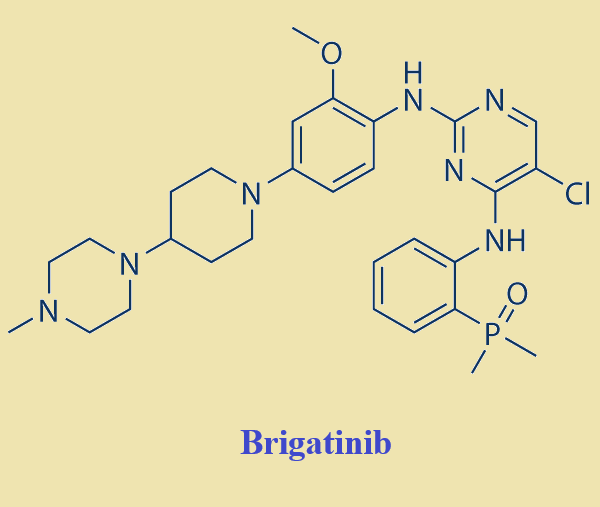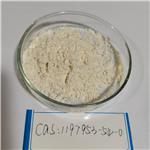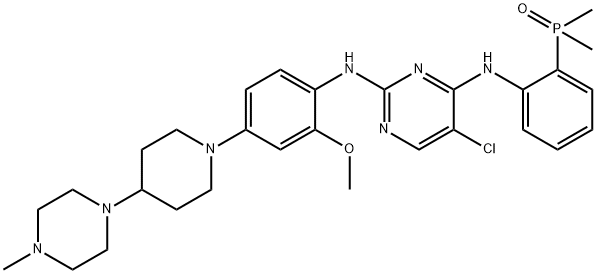Brigatinib: Indications, Dosing, Mechanism of Action and Side Effects
Dec 16,2024
Indications
Brigatinib is a new generation anaplastic lymphoma kinase (ALK) inhibitor. It has been approved for the treatment of adult anaplastic lymphoma kinase (ALK)-positive patients with metastatic non-small cell lung cancer (NSCLC), and is recommended by the National Comprehensive Cancer Network (NCCN) as a preferred first-line, Class 1 treatment option for ALK+ advanced or metastatic NSCLC.

In the latest results from its Phase III clinical trial, the ALK inhibitor brigatinib was shown to be superior to crizotinib in patients with untreated non-small cell lung cancer. Brigatinib showed longer progression-free survival, higher objective response rates, better efficacy against brain metastases, and less impairment of patients' quality of life.
Dosing
The recommended dosage for Brigatinib (ALUNBRIG) is:
90 mg orally once daily for the first 7 days; then increase the dose to 180 mg orally once daily.
Administer ALUNBRIG until disease progression or unacceptable toxicity.
If ALUNBRIG is interrupted for 14 days or longer for reasons other than adverse reactions, resume treatment at 90 mg once daily for 7 days before increasing to the previously tolerated dose.
ALUNBRIG may be taken with or without food. Instruct patients to swallow tablets whole. Do not crush or chew tablets.
No dose adjustment is required in patients with mild or moderate hepatic impairment. The dose of brigatinib should be reduced by approximately 40 per cent in patients with severe hepatic impairment.
Mechanism of Action
Brigatinib is a tyrosine kinase inhibitor with activity against a variety of kinases, including ALK, ROS1, insulin-like growth factor 1 receptor, and epidermal growth factor receptor deletion and point mutations. Patients with ALK-positive NSCLC produce an aberrant form of ALK in their bodies, which stimulates the division and growth of cancer cells with uncontrolled use. Brigatinib acts by inhibiting ALK phosphorylation and activation of downstream signalling proteins, leading to a reduction in cancer growth and spread.
Side Effects
Adverse effects of Brigatinib are tolerated and controlled. The most common adverse reactions include: diarrhoea, malaise, nausea, rash, cough, myalgia, headache, hypertension, vomiting and dyspnoea. Other possibly more serious adverse reactions include: pneumonitis, hyperglycaemia, hypertension, bradycardia, visual disturbances, hepatotoxicity, photosensitivity and abnormal biochemical markers (e.g., elevated creatine phosphokinase (CPK) and pancreatic enzymes, lymphopenia).
References:
[1] Brigatinib Outperforms Crizotinib as First-Line Therapy.[J]. Cancer discovery, 2020, 10 2. DOI:10.1158/2159-8290.CD-NB2019-143.
[2] NEERAJ GUPTA. Clinical Pharmacology of Brigatinib: A Next-Generation Anaplastic Lymphoma Kinase Inhibitor.[J]. Clinical Pharmacokinetics, 2023, 62 8. DOI:10.1007/s40262-023-01284-w.
[3] MICHAEL J HANLEY. Brigatinib pharmacokinetics in patients with chronic hepatic impairment.[J]. Investigational New Drugs, 2023, 41 3. DOI:10.1007/s10637-023-01339-6.
- Related articles
- Related Qustion
- Brigatinib: Development History and Preclinical Studies Nov 19, 2024
Brigatinib, a crucial treatment for NSCLC patients with EGFR and ALK mutations, effectively inhibits ALK with unique features, overcoming resistance and offering hope in lung cancer treatment.
- The warnings and precautions of Brigatinib Mar 6, 2024
ALUNBRIG (Brigatinib) is a kinase inhibitor indicated for the treatment of adult patients with anaplastic lymphoma kinase (ALK)-positive metastatic non-small cell lung cancer (NSCLC) as detected by an FDA-approved test.
- Brigatinib: mechanism of action and pharmacokinetics and side effects Jul 12, 2023
Brigatinib is a small-molecule targeted therapy for advanced non-small cell lung cancer. Adverse events include nausea, diarrhea, fatigue, cough, interstitial lung disease, etc.
Supplementation with pyridoxal 5'-phosphate monohydrate can synthesize neurotransmitters such as dopamine and serotonin, maintaining a healthy nervous system.....
Nov 4,2025Biochemical EngineeringChlorhexidine mouthwash is the near-neutral solution (pH range 5-7), only advised for topical use and never for systemic administration.....
Sep 4,2024APIBrigatinib
1197953-54-0You may like
- Rolapitant Synthesis
Dec 22, 2025
- Synthesis of 2-(2-Chlorophenyl)cyclohexanone
Dec 22, 2025
- Preparation methods and application of 2-(2-Ethoxyethoxy)ethyl acrylate
Dec 22, 2025
- Brigatinib
-

- $0.00 / 1kg
- 2025-12-22
- CAS:1197953-54-0
- Min. Order: 1kg
- Purity: 99.0%
- Supply Ability: 10000
- Brigatinib
-

- $0.00 / 25kg
- 2025-12-01
- CAS:1197953-54-0
- Min. Order: 1kg
- Purity: 99%
- Supply Ability: 10000KGS
- Brigatinib USP/EP/BP
-

- $1.10 / 1g
- 2025-11-18
- CAS:1197953-54-0
- Min. Order: 1g
- Purity: 99.9%
- Supply Ability: 100 Tons min






